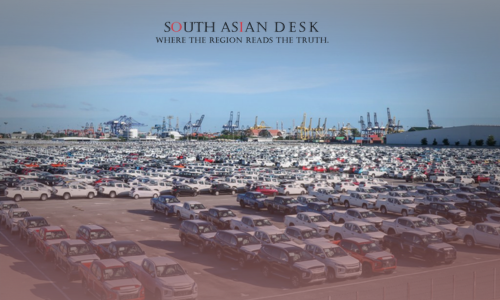In a move that has sparked hope among workers and stakeholders in Pakistan’s automotive industry, the government has committed to bolstering the sector through targeted reforms and policies, addressing longstanding challenges that have affected local employment and economic growth.
Government Pledges Essential Support to Overcome Hurdles
At the recent Auto Parts Summit 2025, organised by the Pakistan Association of Automotive Parts and Accessories Manufacturers (Paapam), Special Assistant to the Prime Minister on Industries and Production, Haroon Akhtar Khan, outlined a comprehensive strategy to enhance the competitiveness of the domestic automotive industry. This pledge comes at a critical time, as the sector grapples with fluctuating sales and external pressures, yet shows promising signs of recovery through innovation and international partnerships.
Government Commitments to the Automotive Industry
The administration is focusing on revitalising key areas within Pakistan’s automotive industry, including the introduction of a new tariff policy, an updated industrial policy, and regulatory reforms aimed at fostering a more robust manufacturing environment. Officials have emphasised the revival of struggling industries, such as steel mills, which are vital for supplying raw materials to auto manufacturers. This integrated approach is designed to create a supportive ecosystem that not only sustains current operations but also paves the way for expansion.
Khan assured local manufacturers of unwavering government backing, highlighting the need for them to achieve global competitiveness. To ensure fairness, the government has promised to enforce stringent quality standards on imported parts and vehicles, levelling the playing field for domestic producers. Recent announcements further build on this, with Commerce Minister Jam Kamal Khan revealing plans to reduce auto tariffs over the next five years, a step intended to stimulate car exports and integrate Pakistan more deeply into international trade networks. This aligns with a new US trade deal, which is expected to provide additional momentum for the sector.
Adding to these efforts, the government has reaffirmed its dedication to the New Energy Vehicle Policy 2025-30, promoting research, development, and adoption of electric vehicles. Partnerships with Chinese firms, including a $100 million investment by Nishat Group in collaboration with Chery Automobile Co for electric-powered vehicles, underscore this shift. Local assembly is set to begin in October, with full manufacturing to follow, offering a beacon of hope for job creation and technological advancement in a sector that employs thousands.
Challenges Facing Local Manufacturers
Despite these positive developments, the automotive industry in Pakistan faces significant obstacles that evoke concern for the livelihoods of many. Industry leaders, including Paapam Chairman Usman Malik, have voiced worries over the commercial import of used cars, which they argue undermines local production and contradicts the push towards environmentally friendly electric vehicles.
Local auto parts manufacturers currently supply 70 per cent of components for cars and 90 per cent for motorcycles, contributing substantially to employment and the economy. However, the influx of imported used petrol and diesel vehicles threatens to erode this foundation, potentially leading to factory closures and job losses that could ripple through communities. Malik has warned that such policies risk “destroying” the domestic industry, a sentiment echoed in recent discussions where sales plunged 49 per cent post-budget due to economic uncertainties.
Moreover, erratic policies have burdened middle-class buyers, with luxury imports thriving while local innovation stalls. The sector’s isolation from global value chains and outdated infrastructure further compounds these issues, as highlighted in various analyses. Lower policy rates and a stable exchange rate are anticipated to ease import costs, yet stakeholders urge consistent enforcement to protect vulnerable workers.
Impact on Vehicle Safety Standards
In a landmark step, Pakistan has approved its first law enforcing minimum safety standards for all locally assembled and imported vehicles, addressing long-standing gaps in road safety. This regulation mandates compliance with quality and environmental benchmarks, aiming to reduce accidents and enhance consumer confidence. It represents a crucial reform that could save lives and foster trust in the automotive industry.
Opportunities and Future Prospects
Looking ahead, the automotive industry holds immense potential for Pakistan. Annual exports from the auto parts segment already stand at around $200 million, with products meeting international safety standards, including those from Millat Tractors, being shipped to the United States. The government has formed a committee to support the sector further, promoting healthy competition that could drive innovation and expand consumer choices.
Recent data shows a gradual rebound, with sales up 5.2 per cent in 2024 despite earlier contractions, signalling resilience. Collaborations with Japan and China for industry growth, alongside the Green Tax on internal combustion engines in the 2025-26 budget, indicate a strategic pivot towards sustainable mobility. These initiatives, if implemented effectively, could transform the automotive industry into a cornerstone of economic prosperity, creating opportunities for skilled workers and inspiring a new generation.
As Pakistan navigates these changes, the focus remains on balancing protection for local enterprises with global integration. With government support firmly in place, the automotive industry stands poised for a brighter future, one that safeguards jobs, boosts exports, and contributes to national development.
Published in SouthAsianDesk, August 21st, 2025
Follow SouthAsianDesk on X, Instagram and Facebook for insights on business and current affairs from across South Asia.






